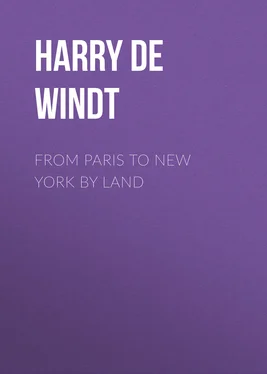Harry De Windt - From Paris to New York by Land
Здесь есть возможность читать онлайн «Harry De Windt - From Paris to New York by Land» — ознакомительный отрывок электронной книги совершенно бесплатно, а после прочтения отрывка купить полную версию. В некоторых случаях можно слушать аудио, скачать через торрент в формате fb2 и присутствует краткое содержание. Жанр: foreign_prose, foreign_antique, на английском языке. Описание произведения, (предисловие) а так же отзывы посетителей доступны на портале библиотеки ЛибКат.
- Название:From Paris to New York by Land
- Автор:
- Жанр:
- Год:неизвестен
- ISBN:нет данных
- Рейтинг книги:4 / 5. Голосов: 1
-
Избранное:Добавить в избранное
- Отзывы:
-
Ваша оценка:
- 80
- 1
- 2
- 3
- 4
- 5
From Paris to New York by Land: краткое содержание, описание и аннотация
Предлагаем к чтению аннотацию, описание, краткое содержание или предисловие (зависит от того, что написал сам автор книги «From Paris to New York by Land»). Если вы не нашли необходимую информацию о книге — напишите в комментариях, мы постараемся отыскать её.
From Paris to New York by Land — читать онлайн ознакомительный отрывок
Ниже представлен текст книги, разбитый по страницам. Система сохранения места последней прочитанной страницы, позволяет с удобством читать онлайн бесплатно книгу «From Paris to New York by Land», без необходимости каждый раз заново искать на чём Вы остановились. Поставьте закладку, и сможете в любой момент перейти на страницу, на которой закончили чтение.
Интервал:
Закладка:
Harry De Windt
From Paris to New York by Land
TO MY WIFE
PREFACE
Many who read the following account of our long land journey will not unnaturally ask: "What was the object of this stupendous voyage, or the reward to be gained by this apparently unnecessary risk of life and endurance of hardships?"
I would reply that my primary purpose was to ascertain the feasibility of constructing a railway to connect the chief cities of France and America, Paris and New York. The European Press was at the time of our departure largely interested in this question, which fact induced the proprietors of the Daily Express of London, the Journal of Paris, and the New York World to contribute towards the expenses of the expedition. Another reason is one with which I fancy most Englishmen will readily sympathise—viz., the feat had never before been performed, and my first attempt to accomplish it in 1896 (with New York as the starting-point) had failed half way on the Siberian shores of Bering Straits.
The invaluable assistance rendered by the United States Government in the despatch of a revenue cutter to our relief on the Siberian coast is duly acknowledged in another portion of this volume, but I would here express my sincere thanks to the "Compagnie Internationale des Wagonslits" for furnishing the expedition with a free pass from Paris to the city of Irkutsk, in Eastern Siberia. In America the "Southern Pacific" and "Wabash" Lines extended the same courtesies, thus enabling us to travel free of cost across the United States, as guests of two of the most luxurious railways in the world.
45 Avenue Kléber, Paris,
October 1903.
PART I
EUROPE AND ASIA
CHAPTER I
THROUGH EUROPE. THE TRANS-SIBERIAN RAILWAY
The success of my recent land expedition from Paris to New York is largely due to the fact that I had previously essayed the feat in 1896 and failed, for the experience gained on that journey was well worth the price I paid for it. On that occasion I attempted the voyage in an opposite direction—viz., from America to France, but only half the distance was covered. Alaska was then almost unexplored and the now populous Klondike region only sparsely peopled by poverty-stricken and unfriendly Indians. After many dangers and difficulties, Alaska was crossed in safety, and we managed to reach the Siberian shores of Bering Straits only to meet with dire disaster at the hands of the natives of that coast. For no sooner had the American revenue cutter which landed us steamed away than our stores were seized by the villainous chief of the village (one Koari), who informed us that we were virtually his prisoners, and that the dog-sleds which, during the presence of the Government vessel, he had glibly promised to furnish, existed only in this old rascal's fertile imagination. The situation was, to say the least, unpleasant, for the summer was far advanced and the ice already gathering in Bering Straits. Most of the whalers had left the Arctic for the southward, and our rescue seemed almost impossible until the following year. When a month here had passed away, harsh treatment and disgusting food had reduced us to a condition of hopeless despair. I was attacked by scurvy and a painful skin disease, while Harding, my companion, contracted a complaint peculiar to the Tchuktchis, which has to this day baffled the wisest London and Paris physicians. Fortunately we possessed a small silk Union Jack, which was nailed to an old whale rib on the beach (for there was no wood), much to the amusement of the natives. But the laugh was on our side when, the very next morning, a sail appeared on the horizon. Nearer and nearer came the vessel, scudding close-reefed before a gale which had raised a mountainous sea. Would they see our signal? Would the skipper dare to lay-to in such tempestuous weather, hemmed in as he was by the treacherous ice? Had we known, however, at the time that the staunch little Belvedere was commanded by the late Capt. Joseph Whiteside, of New Bedford, we should have been spared many moments, which seemed hours, of intense anxiety. Without a thought of his own safety, or a valuable cargo of whales representing many thousands of pounds, this gallant sailor stood boldly in shore, launched a boat, which, after a scuffle with the natives and a scramble over floating ice, we managed to reach, and hauled us aboard the little whaler, more dead than alive. A month later we were in San Francisco, far from the fair French city we had hoped to reach, but sincerely grateful for our preservation. For twenty-four hours after our rescue no ship could have neared that ice-bound coast, and we could scarcely have survived, amidst such surroundings, until the following spring.
A glance at a map will show the route which I had intended to pursue in 1896, although, as this land journey has never before been accomplished (or even attempted), I was unable to benefit by the experience of previous explorers. From New York we travelled to Vancouver, thence across the now famous Chilkoot Pass to the Great Lakes and down the Yukon River to the sea, crossing Bering Straits in an American revenue cutter to the Siberian settlement of melancholy memory. From here I hoped to reach the nearest Russian outpost, Anadyrsk, by dog-sled, proceeding thence along the western shores of the Okhotsk Sea to Okhotsk and Yakutsk. The latter is within a couple of thousand miles of civilisation, a comparatively easy stage in this land of stupendous distances. Had I been able on this occasion to reach Anadyrsk, I could, all being well, have pushed on to Yakutsk, for Cossacks carry a mail, once a year, between the two places. But the connecting link between that miserable Tchuktchi village and Anadyrsk was missing, and so we had to submit to the will of fate.
Follow now on a map my itinerary upon the last occasion, starting from Paris to Moscow, and continuing from Moscow to Irkutsk by the Trans-Siberian Railway. Here we strike in a north-easterly direction to Yakutsk by means of horse-sleighs. Reindeer-sleighs are procured at Yakutsk, and we then steer a north-westerly course to Verkhoyansk. From Verkhoyansk we again proceed (still with reindeer) in a north-easterly direction to the tiny political settlement of Sredni-Kolymsk, where we discard our deer (for there is no more moss) and take to dog-sleds. A journey of nearly two months, travelling almost due east, brings us to East Cape Bering Straits, the north-easternmost point of Asia, and practically half way from Paris to our destination.
From here the journey is fairly easy, for the beaten tracks of Alaska now entail no great hardships. Remote Eskimo settlements like that at Cape Prince of Wales are naturally as primitive as those on the Siberian side, but once Nome City is reached, the traveller may proceed (in summer) to New York solely by the aid of steam.
I shall not weary the reader with details of my preparations. Suffice it to say that, although the minutest care and attention were lavished on the organisation of our food-supply, lack of transport in the Far North compelled me to abandon most of our provisions and trust to luck for our larder, which was therefore frequently very meagrely stocked. Indeed, more than once we were within measurable distance of starvation, but this was the more unavoidable in so far as, even at Moscow, I was compelled to abandon several cases of provisions on account of a telegram received from the Governor-General of Siberia. The message informed me that reindeer were scarce, dogs yet more so, and that, unless the expedition travelled very light, it could not possibly hope to reach even the shores of the Arctic Ocean, to say nothing of Bering Straits.
Читать дальшеИнтервал:
Закладка:
Похожие книги на «From Paris to New York by Land»
Представляем Вашему вниманию похожие книги на «From Paris to New York by Land» списком для выбора. Мы отобрали схожую по названию и смыслу литературу в надежде предоставить читателям больше вариантов отыскать новые, интересные, ещё непрочитанные произведения.
Обсуждение, отзывы о книге «From Paris to New York by Land» и просто собственные мнения читателей. Оставьте ваши комментарии, напишите, что Вы думаете о произведении, его смысле или главных героях. Укажите что конкретно понравилось, а что нет, и почему Вы так считаете.












